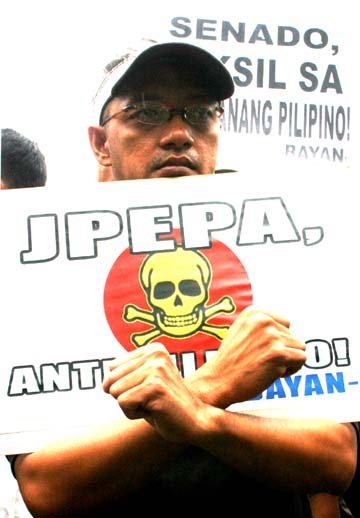Aquino may take up PJEPA

Manila Bulletin | September 16, 2011
Aquino may take up PJEPA
By BERNIE CAHILES-MAGKILAT
MANILA, Philippines — The Department of Trade and Industry is studying whether it has to recommend to Malacañang the inclusion of the Philippines-Japan Economic Partnership Agreement (PJEPA) or not in the agenda of the official visit of President Aquino in Japan later this month.
Tackling the PJEPA during the President’s visit in Japan would be an opportune time since both countries are set to conduct the first bilateral comprehensive review of the free trade agreement since its signing five years ago.
“We are processing our recommendations,” DTI undersecretary Adrian S. Cristobal Jr. told reporters. President Aquino is scheduled to conduct an official visit to Japan on Sept. 25-29.
Cristobal said there are several topics of interest in the bilateral agreement such as the basic requirements and concerns on improving the country’s infrastructure to improve the productivity of business. There is also the tax credits issue to Japanese contractors, which the Philippine government has acknowledged for payment.
Already, the sub-committee meeting on “Business Environment” was held last Thursday here in Manila. A full blown joint committee meeting would be held here in Manila in early December this year where all 12 to 13 sub-committees would convene to review the FTA.
From the DTI side, they would be in-charge of sub-committees on investments, trade in goods, rules of origin, and business environment.
But there are also other sub-committees handled by the Departments of Labor and Foreign Affairs and the National Economic and Development Authority.
Already, the multisectoral Fair Trade Alliance (FairTrade) had filed a motion with the Supreme Court (SC) in August this year seeking the early resolution of the case filed by the Alliance together with Congressmen Lorenzo R. Tañada III, Del R. De Guzman, Carlos M. Padilla, Alfonso V. Umali, former Senator Jovito R. Salonga and former Vice-President Teofisto T. Guingona, Jr.
On December 4, 2008, the Alliance and other petitioners filed a petition for Certiorari and Prohibition with Prayer for the Issuance of a Temporary Restraining Order and/or Writ of Preliminary Injunction seeking to stop the implementation of the agreement because it violates the Constitution.
Fair Trade executive director Mars Mendoza said, “The PJEPA continues to wreak havoc in our domestic agriculture and industry. The agreement even attacks our national sovereignty.
“Now that PJEPA is in the implementation stage even without the final determination of the agreement’s Constitutionality, the unevenness of the agreement is clearly out in the open,” Mendoza said.
She noted the presentation made by the Department of Trade and Industry (DTI) at the House of Representatives’ Special Committee on Globalization and WTO hearing on January 26, 2011, wherein representatives from DTI alleged that the Philippines’ market share in Japan increased.
However, the data presented proves otherwise. Total imports of Japan from the Philippines decline post-JPEPA. Japan’s imports from the Philippines pre-JPEPA were $7. 959 billion in 2006; $8.731 billion in 2007 and $8.426 billion in 2008. These figures are way high compared to post-JPEPA when Japan’s total imports from the Philippines only totaled $6,333,769.
“During the ratification stage of the PJEPA in 2006, DTI made a bold projection that Philippine exports to Japan will soar by 95 percent because of the zero tariff regimes. It looks like they contradicted themselves with the new figures,” Mendoza added.
Mendoza also noted that PJEPA was the subject of the fifty-seventh session of the World Trade Organization (WTO) Committee of Regional Trade Agreements (CRTA) held in 2010 wherein various trade negotiators from different developed countries cited the lopsidedness of the PJEPA against the Philippines.
“No less than the US Trade Representative said that the agreement is ’disappointing’ because a developed country would eliminate tariffs on significantly fewer lines and lower trade volumes than a developing country partner. Japan even ruled out the elimination of tariffs on more than 64.8% of agricultural duties compared to the Philippines’ figure of 99.2%,” Mendoza said.





